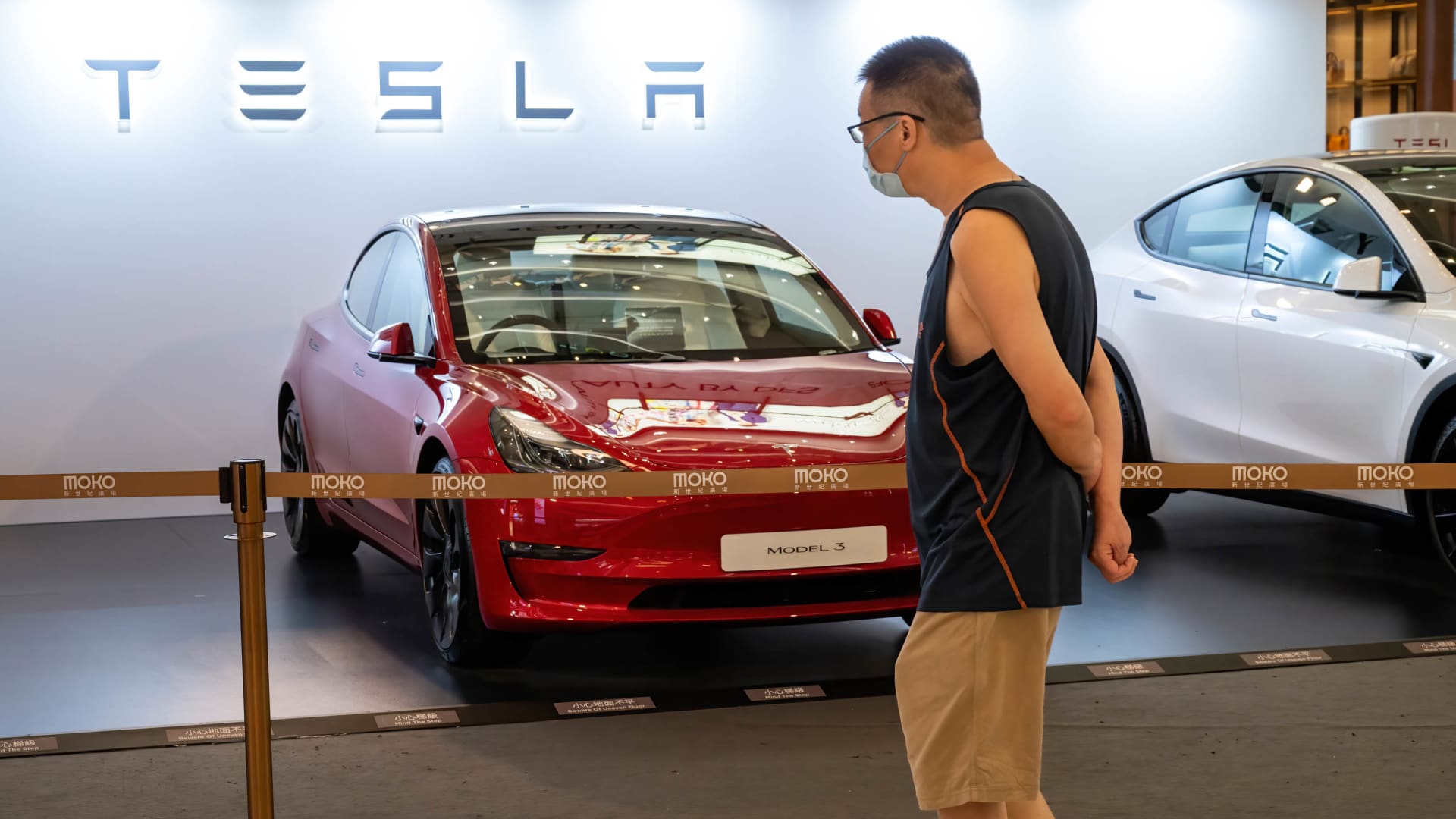A shopper stands in front of a Tesla Motors showroom at a retail shopping mall in Hong Kong.
Sebastian Ng | Sopa Images | Lightrocket | Getty Images
This report is from today’s CNBC Daily Open, our new, international markets newsletter. CNBC Daily Open brings investors up to speed on everything they need to know, no matter where they are. Like what you see? You can subscribe here.
What you need to know today
Tech sell-off
Major U.S. indexes fell Monday, dragged down by a sell-off in technology stocks. Stock futures, however, inched up. Markets in Asia-Pacific traded mixed Tuesday. Japan’s Nikkei 225 fell for the fourth straight day, but analysts think the rally in Japanese stocks, which began in late May, isn’t a bubble like the one that burst in 1990.
Leaders speak
In his first televised address since the Wagner Group marched on Moscow, Russian President Vladimir Putin said organizers of the armed mutiny will be “brought to justice” and that his military would have crushed the rebellion. Separately, U.S. President Joe Biden said the U.S. “had nothing to do with [the events], this was part of a struggle within the Russian system.”
Microsoft wants explosive growth
Microsoft CEO Satya Nadella wants the tech giant to hit $500 billion in revenue by fiscal 2030, according to a court filing. That’s more than double its $198.26 billion in revenue for 2022, implying revenue growth of at least 10% per year. Indeed, Nadella sketched out a “20/20” goal, which involves growing revenue and operating income by 20% year over year.
On track for 5%
China is on track to hit its annual growth target of “around 5%,” said Chinese Premier Li Qiang at the World Economic Forum’s Annual Meeting of the New Champions. China’s economy has been struggling lately, with economic activity growing slower than expected in May. Separately, Aramco’s CEO Amin Nasser thinks oil demand from China and India will continue growing and prop up the market this year.
[PRO] Imminent drop in the S&P?
Mile Wilson, Morgan Stanley’s chief U.S. equity strategist, thinks the “risks for a major correction [in the stock market] have rarely been higher” because of four factors that will weigh down on markets. Wilson, who predicted the fall in markets last year, thinks the S&P 500 will drop to 3,900 in the fourth quarter. That’s around 10% lower from its Monday close, among the most bearish outlooks on Wall Street.
The bottom line
The attempted insurrection in Russia across the weekend dominated headlines, but it didn’t seem to occupy investors’ minds. Instead, “macro factors are likely to remain the main drivers of risk assets,” wrote Barclays’ Global Chairman of Research Ajay Rajadhyaksha in a Monday note.
Indeed, tech stocks slumped across the board as investor enthusiasm over artificial intelligence fizzled out and was replaced by a more clear-eyed view of today’s economic conditions.
Alphabet fell 3.27% after UBS downgraded the company, citing stiff competition in the AI sector. Nvidia and Meta fell in sympathy, losing more than 3% each. But that wasn’t as bad as Tesla’s plunge of 6.06% after Goldman Sachs downgraded the electric car maker because of a “difficult pricing environment for new vehicles.”
The sell-off in tech put pressure on the Nasdaq Composite, which sank 1.16%. The S&P 500 fell 0.45% while the Dow Jones Industrial Average dipped 0.04%.
There might be more pain to come. The tech rally is “running out of steam,” according to Berenberg, a German bank. Tech, as a future-oriented sector, needs lower interest rates if it wants to continue rising.
But with the Federal Reserve emphasizing it’d keep rates high for now, lower rates would imply “a sharp economic slowdown,” Jonathan Stubbs, equity strategist at Berenberg, wrote. Stubbs mentioned that such a scenario would “be to tech’s disadvantage,” but, really, no one would benefit from it.
Nonetheless, with just a few days left before June ends, the three major indexes are poised to finish the second quarter higher. The recession is still months away, it seems — as it’s been for the past year. Fingers crossed we manage to elude it for so long that it gets tired of catching up with us.

